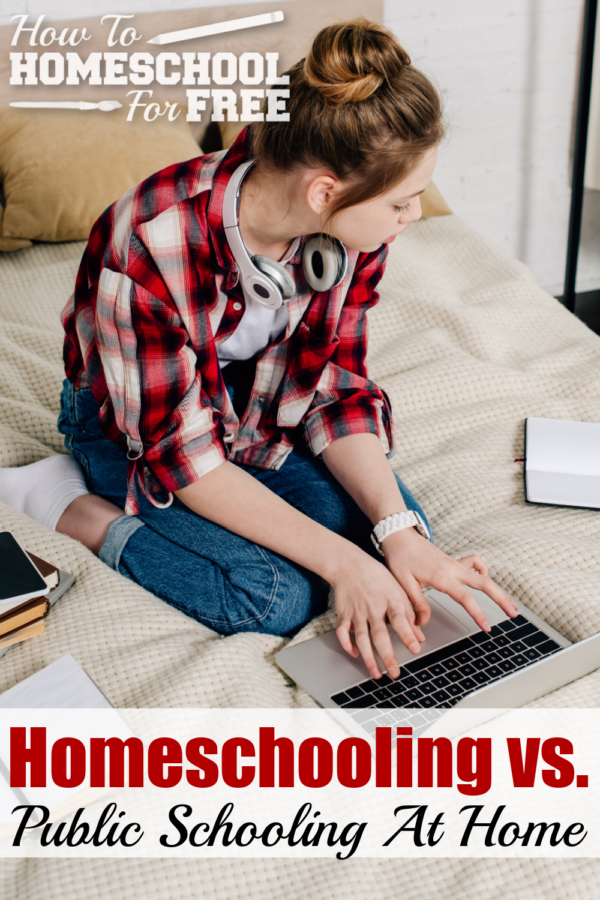
To clear up one thing…
Public schooling at home is actually very different than homeschooling. In fact, the being-at-home part is really about the only thing they have in common. The rigorous structure and lengthy run time of the public school classes might make more sense in a classroom full of 20-25 kids, but it isn’t really necessary with an individual child at home.
While there are many ways to compare these vastly different education methods, for the sake of time I’ve condensed them down to the 3 that I deem to be the most informative.
Time Management
This is probably the biggest distinction. Trying to implement a public school class model at home means using as much, or nearly as much class time as they would in person. This usually means close to an 8 hour day. As a homeschool mom, let me tell you that even our heaviest days have never lasted longer than 4 hours. Asking young children to sit in one place for even 2 hours just isn’t realistic. In person public school classes break up the day with activities, art, music, physical education, and recess. When you remove the time it takes to accomplish all of those things with a bunch of kids, you can shave hours off of your day. Art takes much less time with 2 or 4 children. And P.E. can consist of playing in the yard or going for a walk!
One of my favorite benefits of homechooling has been my children learning how to manage their own time. Now, this is something that happens at different ages for different kids, but in my opinion, the sooner they start, the sooner they master it. Both of my kids were public schooled until 6th grade and it took all of 6th and some of 7th to get them working mostly independently. But once we got there, it freed up a lot more of everyone’s time. They could come to me with questions and to take tests, so I had more free time in the day. In addition, they were able to move through their studies at their own pace, increasing their independence and thus, their confidence.
Accountability
This is a big one. It may seem like the public school route makes this easier, since the teacher makes the lesson plan, administers tests, and keeps track of grades. But as parents, we are still be the driving force behind accomplished tasks, just like always. We will be the ones reminding them about due dates, which chapters they should have read, and how many notecards should be finished by the end of the week.
This happens in your homeschool day as well, but the schedule and due dates are up to you. What is also up to you is the flexibility to double up when assignments are short or simple, and to take extra time when needed to tackle the more complex items in your week. Lesson planning may require a bit more work on the front end, but the freedom to switch it up make it fit your schedule makes it so worth it!
Educational Gaps
You may worry that it’s taking forever to complete the curriculum you’re using. You feel guilty for not getting through it all. Will your kid learn everything they are supposed to? Are they experiencing gaps in their education? At the public school they are more on top of things like this, right?
Well…. teachers can take up to 6 weeks off of the regular curriculum (every year) to prepare for standardized testing. Because if they score well on the test, the school gets more funding. So rather than finishing out the tough concepts at the end of the year, focus goes on multiple-choice logic questions and learning how to read graphs- for weeks.
Lots of things take up instructional time in a public classroom: school assemblies, pep rallies, holiday celebrations, field trips, fire drills, disruptive behaviors, movie days, substitute teacher days — and the list goes on. Many teachers never finish a given curriculum. Now, those distractions might not be happening with virtual learning at home, but many educators are expected to fill most of that time anyway.
The bottom line is…
You can do it! You are more than equipped to educate your children at home, your way. Meaningful education that fits your individual children is easily obtainable, affordable, and can fit seamlessly into your family’s lifestyle. There are a ton of great resources to check out on this page, and support to help you with your questions!
***Make sure to join our How to Homeschool for Free Facebook Support Group for daily encouragement in your homeschooling journey!***






